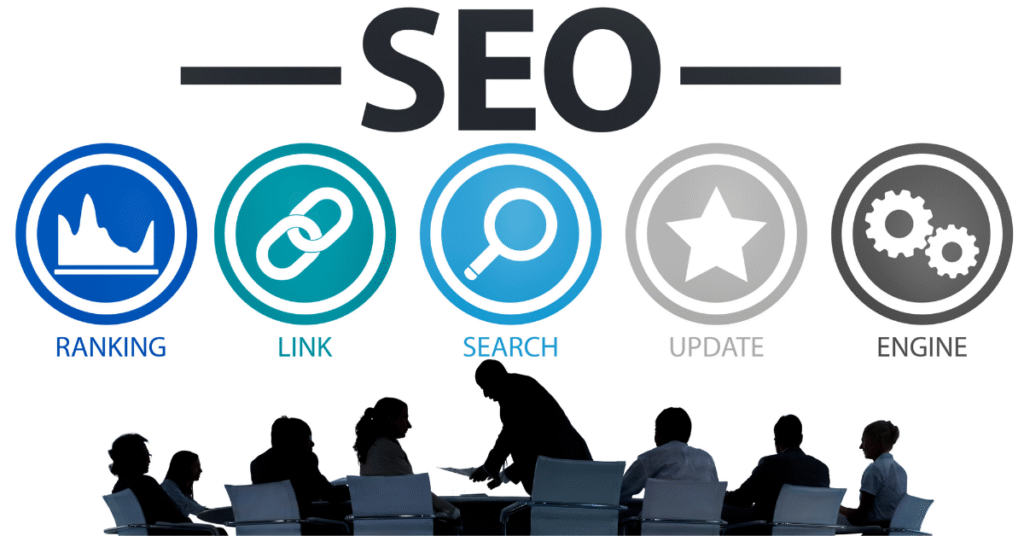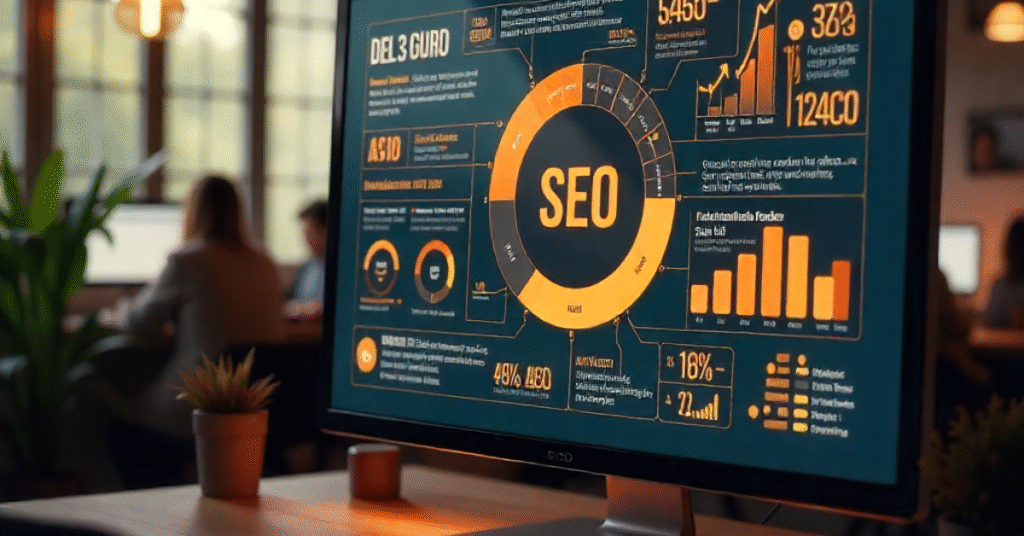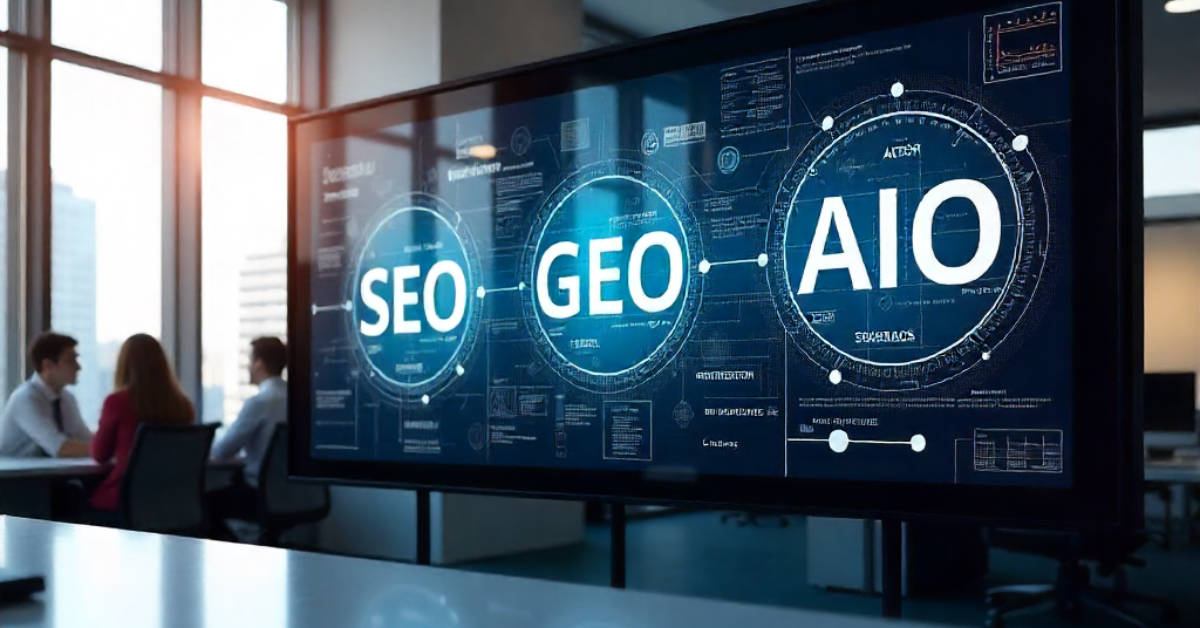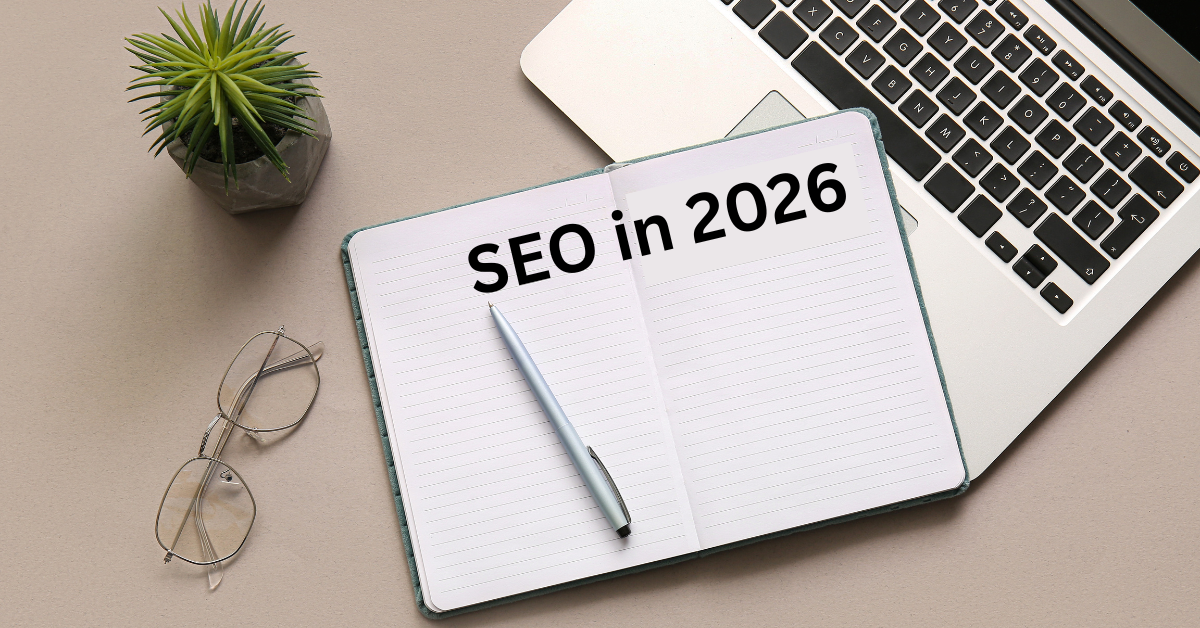SEO Roots to GEO & AIO marks the journey of how online visibility has shifted over time. In the early days, Search Engine Optimization (SEO) focused on keywords, link building, and writing content that could push a website higher in search results. It was simple but effective businesses that learned the rules of SEO gained attention quickly.
Then came GEO, short for Geographical Optimization. As people started searching with phrases like “near me” or expecting location-based answers, local presence became essential. GEO connects digital visibility to real-world places, making sure a shop, service, or restaurant appears when someone nearby looks for it. Without GEO, a business risks being invisible in its own community. Artificial Intelligence Optimization (AIO) is the newest stage. Search isn’t just text anymore it’s voice queries, AI chat tools, and smart assistants. These systems don’t rely only on matching words; they interpret meaning and intent. Content has to be written in a way that both people and AI can easily understand. Taken together, SEO Roots to GEO & AIO reveal how visibility online keeps adapting. Each stage builds on the last, shaping how brands reach people whether globally, locally, or through intelligent systems.
Birth of SEO
When we talk about SEO (Search Engine Optimization), we are talking about the roots of digital visibility. SEO started in the mid-1990s, when the internet was still young. At that time, websites were hard to find. Even big names like music bands could not appear in early search engines. A famous story is about the rock band Jefferson Starship. Their manager wanted the band’s official site to show up on search results. But even when people searched for the exact name, the site was not visible. This problem created a new question: How can we make websites easy to find? The answer became what we now call SEO
Several people claim credit for naming and shaping SEO. Bruce Clay used the word “optimization” from his background in computer systems. Bob Heyman, John Audette, and others also helped spread the term. Later, Danny Sullivan popularized SEO through his writing and news coverage of the search industry. These early pioneers built the language that digital marketers still use today. The first lesson from SEO’s birth is simple: names matter. A good name can spread fast, guide practice, and give credit to innovators.

Why Optimization Matters
From the start, the keyword in SEO was optimization. This word means to make something better. In this case, it meant making websites easier to find in search engines. But there was also debate about the grammar. Despite this grammar issue, the word stuck. It became powerful because it explained action: people could do SEO to improve results. That sense of action gave marketers focus. Today, as we move toward new terms like GEO and AIO, we face the same questions. GEO stands for Generative Engine Optimization. AIO stands for Artificial Intelligence Optimization. These words also carry “optimization,” showing that the idea of improving visibility remains central.
But the danger is clear. If the term does not sound natural or useful, it may not last. Just as “Search Engine Positioning” (an early competitor to SEO) never caught on, some modern names may fail too.
From Roots to Branches
SEO started small. In the 1990s, only a few hundred people worked in the field. They shared ideas, debated names, and tested methods. Over time, the community grew to thousands, then millions. With more voices, reaching agreement became harder.
Still, the foundation stayed the same: on-page work (content, titles, metadata) and off-page work (links, authority, visibility). These two areas defined SEO for decades. Even when social media and AI arrived, these roots stayed strong. Bruce Clay himself joked with an “Old McDonald” framework E-I-E-I-O to show how flexible “optimization” has become. According to him, GEO and AIO are not separate from SEO. They are specialties under the SEO umbrella
This view matters. It reminds us that new acronyms may look fresh, but they grow from the same soil. Whether we say SEO, GEO, or AIO, the heart is still making content visible and useful for users.
GEO, AIO, and the Challenge of Names
Now, let us look deeper at GEO and AIO.
- GEO (Generative Engine Optimization): This term points to optimization for AI tools that generate answers, like ChatGPT or other large language models (LLMs). But here is a problem: very few people call these systems “generative engines.” We say AI, GPT, or LLM. Because of this, GEO may not feel natural
searchengineland-com-origins-se…
. - AIO (Artificial Intelligence Optimization): This feels clearer because “AI” is a common word. Many businesses already talk about “AI-powered tools.” Still, AIO may also face resistance. It is new, and people are used to saying SEO.
In the past, terms like “Search Engine Positioning” faded because they did not connect strongly. The same risk exists today. Unless GEO or AIO becomes part of normal speech, SEO may remain the stronger brand.
Lessons from History
History shows us a pattern. In the beginning, pioneers argued over what to call their new work. They finally chose “SEO,” and it spread because it was short, clear, and easy to use.
Today, with GEO and AIO, we face the same stage. People want to name the future of search. They want to coin the next big term. But just like before, many voices compete, and no one may fully agree.
One more challenge exists: the world is now much bigger. Millions of marketers debate online. Different regions and languages bring different views. That means global consensus will be harder than ever.
The key lesson is this: the work matters more than the name. Whatever term wins, the goal is the same: making websites, content, and brands more visible in a world shaped by search and AI.
How SEO Spread Across the World
After the first use of the term SEO, the idea spread quickly. At first, there were only a few pioneers. They met in small groups, at conferences, or online forums. But soon, businesses realized the power of search. If your site showed up first on Google, you could get more customers.
By the late 1990s and early 2000s, SEO became a business itself. Agencies were born. Writers, developers, and marketers all worked together to help websites get higher rankings.
Books also played a role. Frederick Marckini wrote Search Engine Positioning in 1999. Mike Grehan wrote another major book at the same time. Both books taught people how to improve their sites. But in the end, the word “SEO” won over “positioning.” Why? Because SEO was short, easy, and clear. If “positioning” had won, today we might talk about Generative Engine Positioning (GEP) or Artificial Intelligence Positioning (AIP). But those terms do not sound natural. This shows again why names are important for spreading ideas

The Problem With GEO
Let’s look again at GEO. GEO stands for Generative Engine Optimization. It points to AI systems that generate answers instead of showing links. Think of tools like ChatGPT or other large language models. But here is the issue: people do not call these tools “generative engines.” They call them AI, bots, or LLMs. Because of this, GEO may not feel real. It feels like a name invented in a meeting, not a name people use in daily life. Another problem with GEO is that it creates confusion. In marketing, “GEO” already means “geography.” For years, people used GEO to mean location targeting, like “geo-based ads.” This double meaning can confuse beginners. Finally, GEO does not explain some of the most important things AI can do. AI is not just about generating answers. AI can also automate workflows. It can act as an agent. It can handle tasks without human input. GEO says nothing about this bigger role
The Rise of AIO
Now, let us talk about AIO: Artificial Intelligence Optimization. This term may have more strength. Why? Because the words are simple. Everyone knows “AI.” Companies use “AI-powered” to sell many things, from apps to cars.
AIO also feels natural as a next step after SEO. Just replace “search engine” with “artificial intelligence.” Both keep “optimization.” This creates a link between old and new.
But AIO has its own challenge. The word “AI” is very broad. AI can mean many things: chatbots, image tools, speech recognition, or data analytics. If we say AIO, are we talking about optimizing for chatbots? Or for search engines powered by AI? Or for content created by AI?
Without clear focus, AIO may become too wide to be useful. Still, it has a better chance of sticking than GEO.
Optimization in the AI Era
What does optimization mean in the AI era? In the 1990s, optimization meant adding keywords, building links, and fixing code. In 2025, optimization must include new layers:
- Prompt Optimization – AI tools like chatbots respond to prompts. The way you write prompts can change the answers. Marketers must learn how to “optimize prompts.”
- Content Optimization for AI Search – Generative engines do not show ten blue links. They create one answer. Brands must learn how to make their content appear in that single answer.
- Automation Optimization – AI is not only for answers. It can perform tasks. Optimizing workflows for AI is also part of the game.
- Trust and Authority – In a world full of AI-generated content, trust becomes key. Search engines and AI models must learn which content is reliable. Optimizers must focus on authority, not just volume.
These areas show that the roots of SEO visibility, structure, and trust are still important. But they must expand to fit new AI tools.
The Human Side of Naming
Why do names matter so much in digital marketing? Because humans think in stories and symbols. A short name like SEO, GEO, or AIO becomes a symbol for a whole practice.
- SEO became a symbol for making websites visible.
- GEO tries to be a symbol for optimization in a generative world.
- AIO aims to show that AI is the new stage.
But symbols only work if people use them. If marketers, influencers, and users repeat the name, it becomes real. If not, it fades away.
For example, “Search Engine Positioning” was once serious. But no one uses it today. The same could happen with GEO or AIO.
History teaches us: the winning name will not only describe the work, but also feel natural in conversation.
GEO and AIO in Action
It helps to see examples. What does GEO or AIO look like in real work? Let’s break it down.
Example 1: GEO in Practice
Imagine you ask ChatGPT, “What is the best laptop for students in 2025?” Instead of giving you 10 links, the AI writes a clear answer. It may say: “The top laptops for students are…” and then list a few options.
If you are a laptop brand, your goal is to be in that answer. That is Generative Engine Optimization. You must design your website, product descriptions, and content in a way that AI tools can use. It is not about ranking #1 anymore. It is about being inside the AI’s single response.
Example 2: AIO in Practice
Now think about AI tools beyond search. A business uses an AI assistant to analyze customer reviews. The AI creates reports. If you want your brand to look good, you need to optimize for AI. That may mean writing clear review replies, using structured data, and training AI systems with your brand voice. This is Artificial Intelligence Optimization (AIO).
The difference is small but important. GEO is narrow about generative answers. AIO is wider about making your brand AI-ready in many ways.
Why Businesses Care
Why should businesses care about these new terms? The answer is simple: visibility means survival.
In the old days, if your site was not in the top 10 results, you lost traffic. In the new world, if your brand is not part of an AI answer, you may vanish completely.
Here are the risks:
- If GEO is ignored, AI tools may not mention your business.
- If AIO is ignored, your brand may not show up across AI systems, from chatbots to shopping tools.
In both cases, the result is the same: less visibility, fewer customers, lower growth. That is why naming debates are more than language. They connect directly to money, jobs, and future growth.

The Global Dimension
SEO grew in an English-speaking world first. But soon, it spread to every language. Today, SEO is global. People in China, Brazil, India, and Africa all use search engines.
The same will happen with GEO and AIO. But the challenge will be harder. Why? Because the words themselves may not translate well. For example:
- “Optimization” is not easy to say in every language.
- “Generative engine” may sound strange or meaningless outside English.
- “AI” is widely known, but how each culture explains it is different.
This means global marketers may adopt different words. Some regions may stick with SEO, even for AI tools. Others may invent their own local acronyms.
The global challenge adds another layer: no one word may dominate worldwide. We may see many versions, but all pointing to the same work improving visibility in the AI era.
The Workflow Shift
One of the biggest changes AI brings is workflows. In the past, SEO was about doing tasks one by one:
- Research keywords.
- Write content.
- Build links.
- Analyze results.
Now, AI can do many of these steps. Tools can generate keyword lists, write draft content, and even test optimization automatically.
This means the role of humans also changes. Marketers must become directors. Instead of doing every small task, they must guide AI, check results, and add human creativity.
Optimization is no longer only about search engines. It is about making sure AI tools do the right work for you. This is a big shift and one that supports the rise of AIO.
Trust, Authority, and Ethics
Another big part of the future is trust. In a world full of AI answers, people will ask: Is this true? Can I trust it?
Search engines already use signals like backlinks and domain authority. AI must do the same but in new ways. Businesses that want to win must build credibility:
- Clear author names.
- Verified sources.
- Transparent practices.
At the same time, ethical issues grow. What if AI creates wrong answers? What if it spreads bias? Optimization in the AI age must include ethics. If not, users will lose trust, and brands will pay the price.
Will SEO Disappear?
People often ask: Will SEO die? The answer is simple no. SEO will not vanish. It continues to shift with new tools and habits, but the purpose stays steady: help content get found and connect people with information.
Think of SEO as a tree. The roots stay the same: make content visible. The branches, however, keep spreading in different directions. In the 1990s, meta tags carried the weight. In the 2000s, links dominated. The 2010s pushed mobile design, site speed, and usability to the front. Now, in the 2020s, artificial intelligence and voice search are shaping how results appear. Each decade adds growth while the roots keep everything grounded. GEO and AIO are not replacements for SEO. They are fresh branches growing from the same trunk. GEO ties visibility to location, placing local businesses in front of people when they search nearby. AIO extends SEO into the world of smart assistants and AI-driven tools, where context and natural language matter more than simple keyword matching.
So, will SEO disappear? No. Like a strong tree, it adapts. The roots remain while new branches spread outward, keeping digital visibility alive and evolving.
What This Means for Businesses
If you are a business leader or marketer, here is the key: do not wait for the perfect name. Whether people call it SEO, GEO, or AIO, your work is the same.
- Make sure your content is clear and useful.
- Make sure AI tools can find and use your data.
- Build trust and authority in your field.
- Be ready to adapt to new platforms and terms.
The Future of Optimization
Looking at the next five years, here is what may happen:
- SEO will stay as the main umbrella term. It is too strong to disappear.
- AIO may grow because AI is everywhere. Businesses will want a word that connects with AI.
- GEO may fade unless people adopt “generative engine” as common language, which seems unlikely.
At the same time, new terms may appear. Someone might coin another acronym that feels stronger. Just like in the 1990s, many people want to be the “first” to name the future.
But no matter the word, the work will center on one truth: digital visibility is survival.
The Human Side of Digital Visibility
In the end, names like SEO, GEO, or AIO are about people. They are about how humans explain complex work. They are about how teams teach, learn, and share. Digital marketing is not just about algorithms. It is also about human language. We need simple words to carry big ideas. That is why these debates matter. Think about it: if early pioneers had chosen “Search Engine Positioning,” the story of the internet would sound different today. The same may be true tomorrow. If AIO wins, our language will shift again.
Final words
From SEO to GEO to AIO, the story is one long thread. The thread is about making content easy to find, easy to trust, and easy to use.
The roots of SEO remind us that names guide industries. The new terms GEO and AIO show us that language continues to evolve. But the deeper truth is this: optimization is never finished.
The tools will change. The acronyms will change. The platforms will change. But the goal remains the same: help people find what they need, when they need it.
So, do not fear the future. Instead, remember the past. Just as SEO grew from small debates to global impact, the next stage will also find its place. And if history is a guide, the winners will be those who focus not just on names, but on trust, clarity, and real value.
FAQs: SEO, GEO, and AIO
1. What is SEO in simple words?
SEO means Search Engine Optimization. It is the practice of making websites easier to find on Google and other search engines.
2. Who invented SEO?
Many people helped. Bruce Clay, Bob Heyman, John Audette, Danny Sullivan, and others all played a role in naming and spreading SEO in the 1990s.
3. What does GEO mean?
GEO means Generative Engine Optimization. It focuses on AI tools like ChatGPT that generate answers instead of showing links. The goal is to appear in those AI answers.
4. What does AIO mean?
AIO means Artificial Intelligence Optimization. It is broader than GEO. It includes all ways to make your brand visible in AI systems, from chatbots to automation.
5. Which is better: GEO or AIO?
AIO may be stronger because people already use “AI” in daily life. GEO is less common, since few call AI tools “generative engines.”
6. Will SEO disappear?
No. SEO will evolve. GEO and AIO are branches, but SEO is still the trunk. The roots remain: visibility, trust, and optimization.
7. Why do names matter in digital marketing?
Because names are symbols. They make it easy for people to share and teach ideas. A good name spreads faster, and shapes how people understand the work.
8. Should my business care about GEO or AIO?
Yes. Even if the names change, the work behind them is real. Your content must be ready for AI tools, not just search engines. If you ignore this, your visibility may drop.
9. What is the biggest challenge with GEO?
The biggest problem is that people do not call AI systems “generative engines.” This makes GEO feel unnatural and hard to spread globally.
10. What is the main takeaway from all this?
The main point is: focus on the work, not the label. SEO, GEO, or AIO all mean one thing — making sure your brand is visible in a world shaped by search and AI.





